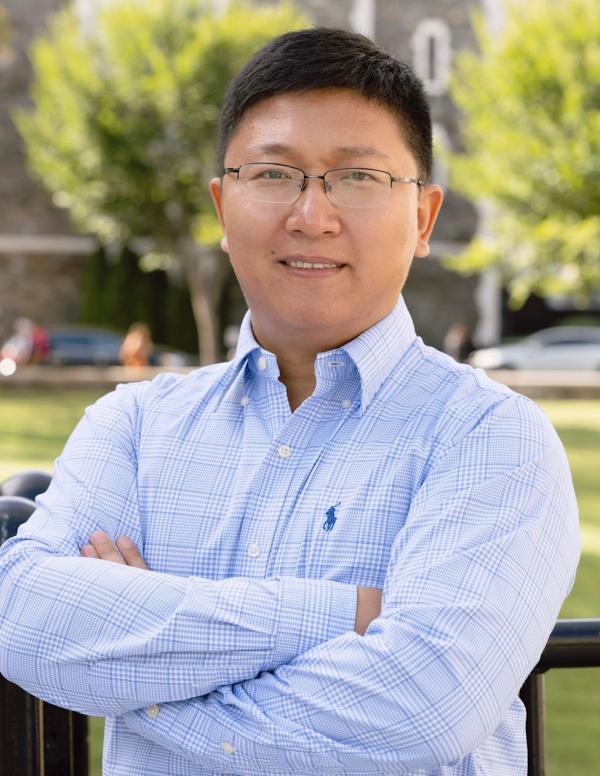
Grove School mechanical engineer Yang Liu leads a U.S. Dept. of Energy-supported project to develop critical processes in plasma-based research.
Funded by a $799,352 U.S. Department of Energy (DoE) Office of Science grant, research is underway at The City College of New York to fundamentally advance understanding of the critical processes in plasma-based anti-/de-icing approaches and plasma-assisted additive manufacturing and coating technologies. The three-year project is led by Yang Liu, assistant professor in the Grove School of Engineering and an expert in experimental fluid mechanics.
According to Liu, plasma-droplet interactions have been recognized as the fundamental mechanisms of many industrial and natural processes, including propulsion, material processing, health care, nanomaterial synthesis, water treatment, and lightning.
“These processes usually involve multiscale multi-physics such as evaporation, heat and mass transfer, charge transfer, interfacial instabilities, and chemical activations. Many molecular-scale reactions and transport processes of short-lived species occur in these mechanisms, for example, transport of O-H radicals from gas-phase plasma to liquid-phase droplet, contributing to the complexity of plasma-droplet interactions in different regimes,” he said.
In recent years, along with the new advancement of plasma-based anti-/de-icing technologies and additive manufacturing (AM) and coating technologies, the micro-scale interactions between plasma discharge and supercooled droplets have gained significant attention due to their fundamental roles in determining the macro-scale multiphase phenomena in these processes. While many efforts have been made to reveal the fundamental physical and chemical processes in plasma-droplet interactions, they are limited in the transport and reaction behaviors between gas-phase plasma and thermally stable liquid-phase droplets.
However, Liu noted the lack of knowledge about the fundamental multi-state multiphase transport behaviors and thermal energy transfer during the complex interactions between plasma discharge and metastable supercooled droplets. “This poses a serious technical challenge and limits the further development of more efficient tools/systems in a wide range of engineering applications, including but not limited to anti-/de-icing technologies and additive manufacturing and coating processes,” he explained.
The overarching goal of the project is to discover new fundamentals of the very complex multi-state inter-phase transport processes and thermal energy transfer during the mutual interactions between plasma discharge and supercooled droplets in two representative regimes. These are: in-flight supercooled droplet traveling through diffuse plasma discharge; and supercooled droplet impinging on surfaces modulated with dielectric barrier plasma discharge.
The project is entitled “Fundamental study of the dynamic and thermal behaviors of supercooled droplet interacting with plasma discharge.”
About The City College of New York
Since 1847, The City College of New York has provided a high-quality and affordable education to generations of New Yorkers in a wide variety of disciplines. CCNY embraces its position at the forefront of social change. It is ranked #1 by the Harvard-based Opportunity Insights out of 369 selective public colleges in the United States on the overall mobility index. This measure reflects both access and outcomes, representing the likelihood that a student at CCNY can move up two or more income quintiles. Education research organization Degree Choices ranks CCNY #1 nationally among universities for economic return on investment. In addition, the Center for World University Rankings places CCNY in the top 1.8% of universities worldwide in terms of academic excellence. Labor analytics firm Emsi (now Lightcast) puts at $1.9 billion CCNY’s annual economic impact on the regional economy (5 boroughs and 5 adjacent counties) and quantifies the “for dollar” return on investment to students, taxpayers and society. At City College, more than 15,000 students pursue undergraduate and graduate degrees in eight schools and divisions, driven by significant funded research, creativity and scholarship. This year, CCNY launched its most expansive fundraising campaign, ever. The campaign, titled “Doing Remarkable Things Together” seeks to bring the College’s Foundation to more than $1 billion in total assets in support of the College mission. CCNY is as diverse, dynamic and visionary as New York City itself. View CCNY Media Kit.
Jay Mwamba
p: 917.892.0374
e:
jmwamba@ccny.cuny.edu